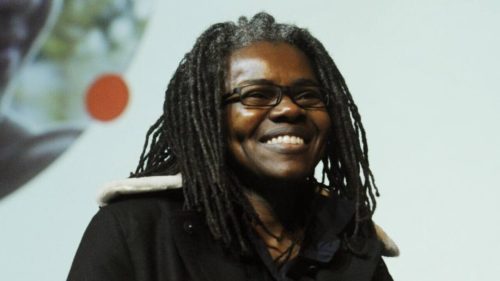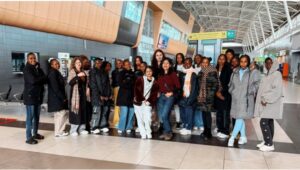
Persuasion in negotiation is often viewed as requiring forceful hard-bargaining strategies. But when you’re facing a hesitant counterpart, a more low-key approach may be best, as seen in the successful effort to bring legendary songwriter Tracy Chapman back to the Grammys stage.
Tracy Chapman’s surprise performance of her 1988 hit song “Fast Car” alongside country star Luke Combs electrified the 2024 Grammy Awards. Combs’ cover had introduced the award-winning folk classic to a new audience. But Chapman’s decision to perform it at the Grammys was far from a foregone conclusion. The story of how she came to play at the awards show attests to the power of persuasion in negotiation.
“Fast Car” zooms up the charts
When Combs was a little boy, his dad played Chapman’s debut album on his truck’s cassette player, he said in a video introducing the song at the Grammys. Combs fell in love with “Fast Car,” in which a young woman trapped in poverty yearns for a better life. It was one of the first songs Combs learned on guitar, and once his career took off, he took to playing it on tour.
While recording his most recent album, Gettin’ Old, Combs decided to record a cover of “Fast Car,” “just for me,” he says in the Grammys video. Per U.S. trademark law, he didn’t need to ask Chapman for permission to record the song, but he wasn’t allowed to promote it, and Chapman would be entitled to the bulk of royalties from the rerecording.
When Gettin’ Old was released in March 2023, two other songs were slated as lead singles. But to everyone’s surprise, “Fast Car” leap-frogged past one of those songs on the radio and “started to go crazy,” one of Combs’ managers, Chris Kappy, told Variety. The song was working its magic on Combs’ fans and on nostalgic older listeners.
Climbing and crossing over
Executives at Combs’ New York label, Columbia Records, were excited about him crossing over from country to the pop charts for the first time, but they needed clearance from Chapman to promote the song, Kappy told Variety. Given that Chapman had stayed out of the public eye for 15 years, that approval was far from guaranteed. “Whatever way she decided to go, we were going to go,” Kappy says. “It’s her song.”
They did get Chapman’s blessing, and Columbia began pushing the song to pop radio stations. “We got kind of romantic about it,” Brady Bedard, Columbia’s senior VP of pop promotion, told Variety. “We’re like, ‘But there’s a whole generation out there that needs to hear this song! That was part of our . . . pitch to radio: It needs to translate to a new generation.”
“Fast Car” rode up the Top 40 and country radio charts in tandem, marking Combs’ crossover to pop and Chapman’s to country. “I never expected to find myself on the country charts, but I’m honored to be there,” Chapman said in her first public statement about Combs’ cover to Billboard. “I’m happy for Luke and his success and grateful that new fans have found and embraced ‘Fast Car.’”
Capitalizing on a lucky connection
The notion of Chapman playing “Fast Car” at the Grammys with Combs was hatched by Raj Kapoor and Patrick Menton, the show’s executive producers. They knew it might be a long shot, with Chapman leading a quiet life in San Francisco away from the music industry.
But they had a bit of luck to draw on: Carla Sacks, Combs’ publicist, had known Chapman’s friend Matthew Rankin, a VP at Nonesuch Records, for decades. “No one really knew how to reach [Chapman], and it was just, like, pure magic, that I was in the know,” Sacks told Rolling Stone. “I knew the doorbell to ring.”
Sacks introduced Rankin to the Grammy producers, who asked him whether Chapman might be interested in performing at the show. Chapman’s team expressed “immediate interest” during an initial call, but Kapoor and Menton avoided trying to secure a firm commitment. “I said to Raj before we got on, ‘Let’s not do this like any other call,’” Menton told Rolling Stone. “In fact, don’t give us an answer.” Instead, they asked Rankin to ask Chapman to mull over the idea.
In November 2023, “Fast Car” won song of the year at the Country Music Association (CMA) Awards, making Chapman the first Black woman to win a CMA. She didn’t attend the ceremony but reached out to Combs afterwards. Their 30-minute phone call “helped plant the seeds” for the possibility of a duet at the Grammys, according to Rolling Stone.
A long yes
At the start of 2024, Kapoor and Menton received the thrilling news that Chapman was up for performing. Rankin told Rolling Stone that he and Chapman had discussed the “moment of confluence,” with the success of Combs’ cover coinciding with her winning Best New Artist at the Grammys 35 years prior. “It felt like a long yes,” Kapoor told Rolling Stone. “It never felt like a no or a maybe.”
Combs reportedly asked for Chapman to have full creative control of the performance, even as the producers aimed to surprise the audience with her appearance. Chapman recruited longtime band members and asked for ample rehearsal time.
The first rehearsal, on January 31, was a “significant and emotional moment,” says Rankin. Not only were Chapman and Combs meeting for the first time, but Chapman also was reuniting with musicians she’d worked with decades earlier. Chapman led six hours of rehearsals on the song over two days.
Despite the long and careful planning—or perhaps in part because of it—Chapman’s appearance remained under wraps. The Grammy audience’s cheers as she strummed the iconic opening bars of “Fast Car” brought a big grin to her face. Combs himself appeared in awe as he traded verses with his idol. “Just to be associated with her in any way is super humbling for me,” he has said.
Persuasion in negotiation
The story behind Chapman’s 2024 Grammy Awards appearance offers a few useful lessons on persuasion in negotiation, particularly when it comes to winning over a hesitant counterpart:
- Draw on trusted connections. When contemplating a big “ask,” don’t underestimate the importance of trust in negotiation. A key means of building trust in negotiations is to draw on any connections you may have to someone they already trust. That trusted go-between can help a reticent negotiator think over the pros and cons of working with you.
- Keep the pressure off. Out of respect for Chapman’s privacy and creative integrity, the Grammys producers veered away from their typical direct negotiating style and merely asked her to think their idea over. When someone may have reservations about your proposal, hard bargaining is likely to backfire. Instead, give them space to consider the matter on their own.
- Show some respect. Throughout the negotiation process, Combs, his label, and the Grammys producers approached Chapman with the respect she deserved. They didn’t pressure her, asked her to lead the performance, and highlighted in promotions that “Fast Car” was and always would be her song. When you show a potential partner through statements and actions that their own preferences come first, you further build trust and goodwill.






